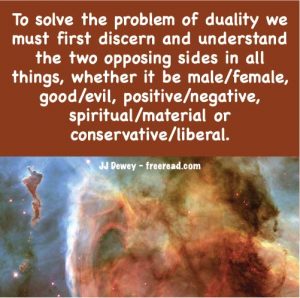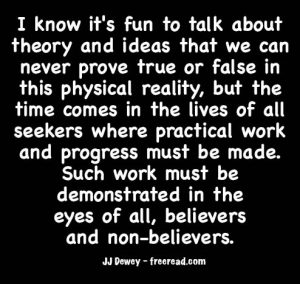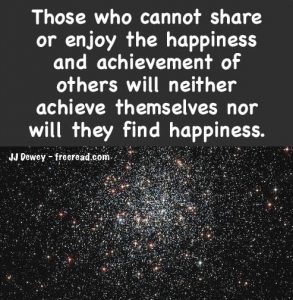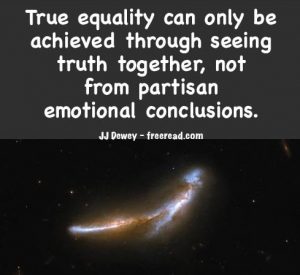
April 28, 2017
Extremism in Alternative Spirituality
Part 6
Was Jesus a Socialist?
Many from alternative spirituality use Jesus along with various scriptures to convince us that high taxes and a government sponsored socialism with the redistribution of wealth is all part of God’s will and therefore a benevolent thing to advocate. These people have many friends in orthodox Christianity such as President Obama who in a speech at the National Prayer Breakfast in February 2012 basically says that those who have abundance should be happy to be taxed by government so they can give it to those who lack because of “God’s command to ‘love thy neighbor as thyself.’”
Then he adds: “But for me as a Christian, it also coincides with Jesus’s teaching that ‘for unto whom much is given, much shall be required.’”
He continues: “It’s also about the biblical call to care for the least of these — for the poor; for those at the margins of our society.”
And that is not all, he also says, “Treating others as you want to be treated. Requiring much from those who have been given so much. Living by the principle that we are our brother’s keeper. Caring for the poor and those in need. These values are old.”
Then he finishes by quoting the Apostle John: “If anyone has material possessions and sees his brother in need but has no pity on him, how can the love of God be in him? Dear children, let us not love with words or tongue but with actions and in truth.”
Wow, that really sounds like Jesus must have really been a socialist … or does it?
As I noted earlier there are 41 definitions of the term “socialism” that covers most every aspect of community and sharing so yes, I’m sure one or more of those definitions could be applied to make the argument that Jesus was a socialist of some kind. The same arguments could be used to make the case that many mainstream Christians of today are socialists for sharing, but that totally misses the case that the Left is subtly trying to make.
And what is that?
First, I’ll tell you what it is not. They are not trying to convince us that we as individuals are supposed to help those in need by giving our time and money directly to them as Jesus advocated. They have no interest in that. Instead, they want us to believe that Jesus wants us to share by giving our money to the government through high taxes so Big Brother can then give to those in need. Since about 50% of the people get money from the government that is a whole lot of need happening out there.
When we hear believers saying that Jesus was a socialist we need to understand that they are not saying he was some fringe definition of socialist that just donates his money to good causes but they are making the case that he would support higher taxes, especially for the rich, so their wealth can be taken from them by force and given to those in need after millions of bureaucrats take their cut in the form of high wages and benefits.
So the question is not: Was Jesus a generous and sharing kind of dude, but was Jesus an advocate of giving to Caesar so Caesar could redistribute according to his will?
The answer should be obvious, but unfortunately it must not be, because a lot of people, in both standard and alternative spirituality, think that Jesus was a socialist who would smile at the current government give-aways and encourage more of them.
There is a huge difference between the redistribution of wealth advocated by Jesus and that of big government people today. The difference is that Jesus taught the people what to do and let them make up their own minds. If a person didn’t want to give to the poor he didn’t have to. Jesus didn’t even follow the selfish guy around to pester him to share his wealth.
On the other hand, when Caesar, or the government, decides that you need to share your wealth it will follow you around with IRS agents and force you to share whether you want to or not.
Yes, all the President’s quotation of scripture regarding sharing with our fellowmen and women does apply to individuals using their own initiative, and if he left it at that he would have a fine sermon to deliver in church. The question is – do the teachings apply to forced sharing or tax and share?
Let us look at a couple of the scriptural arguments used to justify the government confiscating wealth and then sharing it.
One of the most popular is the story of the rich young man who came to Jesus and asked him what he needed to do to obtain eternal life. Jesus responded by telling him to keep the Ten Commandments.
To this the man responded:
“All these I have kept,” … “What do I still lack?”
Jesus answered, “If you want to be perfect, go, sell your possessions and give to the poor, and you will have treasure in heaven. Then come, follow me.” When the young man heard this, he went away sad, because he had great wealth.”
Then Jesus said to his disciples, “I tell you the truth, it is hard for a rich man to enter the kingdom of heaven.” Matt 19:16-23 New International Version
“So there you have it,” says the aspiring socialist. “The rich re supposed to give away all their money to the poor so we are just following the teachings of Jesus in advocating sharing or redistribution of wealth.”
I find it amazing that this comparison can be made with a straight face because there is a big difference between what Jesus advocated compared to the socialists and communists of today.
Jesus advocated sharing through free will. Socialists of today advocate sharing by force. – two very different approaches.
Let us suppose that after the rich man talked to Jesus he went home to discover that a thief had broken into his house and stole all his wealth. The thief then shared that wealth with his family and friends who were in need. Do you suppose the rich man then obtained a spot in the kingdom of heaven because his wealth was shared by force with the poor?
Such an idea obviously makes no sense, yet this is what many want us to believe when they quote this scripture. They seem to think they are helping the rich to enter the kingdom of heaven through taking their wealth by force.
If the taking of wealth by force helps people enter heaven then the churches ought to hire burglars to rob from their rich members. They’d kill two birds with one stone. They will fill their coffers with cash while assisting those resisting rich on the path to heaven.
Notice that the advice of Jesus to the rich man had nothing to do with force. Did he tell the man to go to Caesar or the government and donate his money so the welfare programs of Rome could be enhanced?
No. He did not hint that he should give his wealth to government through either force or free will. Jesus did not even ask him to give to himself or his group. He simply told him to give directly to the poor through his own free will.
Then when the man refused, Jesus let him be. He did not lift a finger to force the man to comply.
This is a difficult scripture for Christians as it is a hard thing for all of us to part with our money. And it is quite possible that Jesus never intended for all the rich to part with their money. Perhaps this particular individual was corrupted by wealth more than most and parting with it would help his mind focus on spiritual things.
Joseph of Arimathea was a rich friend of Jesus who donated his expensive burial tomb. He never gave away all his wealth or else he couldn’t have assisted with this gift, but is considered a saint. Perhaps Joseph’s wealth did not corrupt his soul and he used it toward a good end – making it unnecessary to give it all away at once.
Here is the attitude Jesus said we must have toward the disadvantaged if we want to enter the kingdom of heaven:
“For I was hungry and you gave me something to eat, I was thirsty and you gave me something to drink, I was a stranger and you invited me in, I needed clothes and you clothed me, I was sick and you looked after me, I was in prison and you came to visit me.” Matt 25:35-36 NIV
Again the socialists say, “See. Jesus wants us to share the wealth if we are to get into heaven.”
But again there is no mention of Caesar or force involved. Those who attain the prize are those who are benevolent through their own free will.
There are numerous scriptures admonishing the rich to share, but not one that indicates forced sharing benefits the soul.
It is interesting to note that the authorities were concerned that Jesus was delinquent in taxes or perhaps avoiding them altogether. It is written:
…the collectors of the two-drachma tax came to Peter and asked, “Doesn’t your teacher pay the temple tax’?” “Yes, he does,” he replied. (He apparently lied here to protect his master)
When Peter came into the house, Jesus was the first to speak. “What do you think, Simon?” he asked. “From whom do the kings of the earth collect duty and taxes— from their own sons or from others?”
“From others,” Peter answered.
“Then the sons are exempt,” Jesus said to him. “But so that we may not offend them, go to the lake and throw out your line. Take the first fish you catch; open its mouth and you will find a four-drachma coin. Take it and give it to them for my tax and yours.” Matt 25:24- 27 NIV
Here we learn that Jesus didn’t pay this tax because he didn’t think it applied to him but when accosted – to keep himself and Peter out of trouble – he went ahead and made the payment.
Word must have gotten out that Jesus was dragging his feet in paying taxes for the Pharisees approached him about his view on them in the hope of getting him in trouble with the authorities.
“Tell us then, what is your opinion? Is it right to pay taxes to Caesar or not?”
But Jesus, knowing their evil intent, said, “You hypocrites, why are you trying to trap me? Show me the coin used for paying the tax.”
They brought him a denarius, and he asked them, “Whose portrait is this? And whose inscription?”
“Caesar’s,” they replied.
Then he said to them, “Give to Caesar what is Caesar’s, and to God what is God’s.” Matt 22:17-21 NIV
He avoided saying no, which would have led to an early arrest. Instead he told them it appeared the coin belonged to Caesar since it bore his image. If it belongs to Caesar then let Caesar have it but give to God that which belongs to God.
This confused them enough to leave Jesus alone for a while but word must have gotten out that he wanted the rich to give directly to the poor instead of sharing the wealth through taxes. We find this accusation made at his trial:
And they began to accuse him, saying, “We have found this man subverting our nation. He opposes payment of taxes to Caesar… Luke 23:2 NIV
It should be crystal clear to any honest thinker that Jesus would not be in harmony with today’s tax and share the wealth socialists. If something belonged to an individual it was up to him whether he shared with others or not.
Because of inefficiencies of bureaucracy today it generally costs us two tax dollars to give away one to people in need. The philosophy of Jesus not only operated on free will but was much more efficient. He told the rich to just give their money directly to the poor. Under the plan of Jesus two dollars out of two went to the poor compared to one out of two or three today by Big Brother. Which makes the more sense?
Most Christians today follow the example of Jesus and pay their taxes to keep out of trouble, but as far as helping the disadvantaged goes, in most cases, they would rather have the extra money and help of their own free will rather than being forced to share. A thief with a gun can force you to share but that doesn’t even get your big toe into the Kingdom of Heaven.
“I am for doing good to the poor, but I differ in opinion of the means. I think the best way of doing good to the poor, is not making them easy in poverty, but leading or driving them out of it. In my youth I travelled much, and I observed in different countries, that the more public provisions were made for the poor, the less they provided for themselves, and of course became poorer. And, on the contrary, the less was done for them, the more they did for themselves, and became richer.” –Benjamin Franklin, “Management of the Poor” (1766)
If you missed Part 1 Click HERE For Part 2 go HERE, Part 3 HERE, Part 4 HERE, Part 5 HERE
Copyright by J J Dewey
Index for Older Archives in the Process of Updating
Index for Recent Posts
Easy Access to All the Writings
Register at Freeread Here
Log on to Freeread Here
For Free Book go HERE and other books HERE
JJ’s Amazon page HERE
Gather with JJ on Facebook HERE









